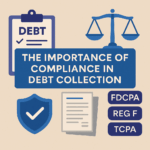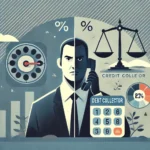The statute of limitations defines how long a creditor has to pursue legal action to collect a debt. Learn when it’s too late to sue—and what it means for creditors and consumers.
Tag Archives: Debt Collection
Understanding the Debt Collection Process: What Happens After You Submit an Account
Submitting an account to collections doesn’t mean losing control—it means gaining a partner. Learn what happens after you place an account with a collection agency, step by step.
The Importance of Compliance in Debt Collection: What Businesses Should Know
Understanding and complying with debt collection laws like FDCPA, Reg F, TCPA, and CFPB regulations is essential for protecting both consumers and your business. Learn what every business should know about compliance—and the risks of getting it wrong.
How Small Businesses Can Effectively Manage Late Payments
Managing late payments is crucial for small business success. Learn practical steps to prevent delinquencies and when to bring in expert help.
Debt Collection Technology: Tools Revolutionizing the Industry
Explore how technology is transforming debt collection. From predictive dialing to debtor analytics, learn how these tools are making recovery smarter and more efficient.
The Benefits of Hiring a Professional Debt Collector Versus In-House Collection
Deciding between in-house debt collection and outsourcing to a professional agency? Learn the pros and cons of each approach to maximize recovery while maintaining customer relationships.
Credit Reporting and Its Impact: Understanding the Role of Debt Collection in Your Credit Score
Debt collection can significantly impact your credit score, affecting your ability to secure loans or credit. When an account goes into collections, it’s typically reported to credit bureaus, resulting in a negative mark on your credit report for up to seven years.
However, there are steps you can take to minimize the impact. From verifying debts and negotiating payment plans to monitoring your credit report for errors, proactive measures can help you regain control. At Credit Counsel, Inc., we’re committed to providing guidance to debtors and ensuring fair and transparent processes.
Read the full article to learn more about debt collection’s impact on credit and how to navigate it effectively.
How to Negotiate With a Collection Agency: Insider Tips from the Pros
Negotiating with a collection agency doesn’t have to be intimidating if you approach it with the right strategy. Start by being open about your financial situation—honesty helps agencies tailor payment options that work for you, whether it’s a lump-sum settlement, installment plan, or hardship arrangement. Make sure to request all terms in writing before making a payment, as this protects both parties from misunderstandings. Knowing your rights under the Fair Debt Collection Practices Act (FDCPA) also empowers you to engage confidently. By staying calm, transparent, and proactive, you can work with the agency to reach a fair and manageable resolution.
Debunking Common Myths About Debt Collection
Debt collection often carries a negative reputation, largely due to widespread misconceptions. Many people believe that debt collectors can harass them or that unpaid debts will always damage their credit. The reality is far more nuanced, with laws like the Fair Debt Collection Practices Act (FDCPA) offering strong protections for consumers. For example, debt collectors cannot threaten or use abusive language, and not all debts in collections have the same impact on your credit score. In this blog, we debunk some of the most common myths surrounding debt collection, helping you understand your rights and how to navigate the process with confidence.
Effective Communication Strategies for Successful Debt Recovery
Effective communication is the cornerstone of successful debt recovery. At Credit Counsel, Inc., we believe that striking the right balance between professionalism, empathy, and compliance with regulations is key. Clear, respectful conversations, active listening, and offering flexible repayment options can build trust with debtors and improve recovery rates. Staying compliant with the Fair Debt Collection Practices Act (FDCPA) while maintaining a courteous tone ensures that your interactions remain both effective and legally sound. In this blog, we’ll explore strategies to enhance communication with debtors for better outcomes.










